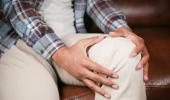RediffGURU Dr Shakeeb Ahmed Khan recommends visiting a physiotherapist, who may use ultrasound and transcutaneous electrical nerve stimulation (TENS), along with stretching and strengthening exercises, to reduce heel pain.
- You can post your questions to rediffGURU Dr Shakeeb Ahmed Khan HERE.

Does your heel hurt during long walks?
Can physiotherapy help heal plantar fasciitis or Achilles tendonitis?
How much time does it take for your body to recover from a surgery?
Dr Shakeeb Ahmed Khan is a senior consultant physiotherapist with over 12 years of experience specialising in orthopaedic and paediatric physiotherapy.
He has served as a technical consultant for the World Health Organisation, the United Nations, the Tata Institute of Social Sciences and several national and international NGOs.
Besides physiotherapy, he is keenly interested in disability management, early intervention, geriatric care and assisting children with disabilities.
- You can post your questions to rediffGURU Dr Shakeeb Ahmed Khan HERE.
Avinash: I am having pain in the heel (near the region where the skin ends (brown) and (white) heel pad starts.
I get pain after walking and it is discomforting.
I showed it to the doctor (GP) and did an ultrasound; everything was fine.
GP told me it could be a sprain from long walks but the pain has been there for the last eight months.
GP gave muscle relaxants but it's not helping.
Please advise what could be the problem and which medical specialist can help me.
Hello Avinash. The heel pain you're experiencing might be due to plantar fasciitis, Achilles tendonitis or heel pad syndrome.
It's recommended that you consult a physiotherapist for a thorough evaluation.
A physiotherapist may use ultrasound and transcutaneous electrical nerve stimulation (TENS) for pain relief, along with providing stretching and strengthening exercises.
Wish you a speedy recovery.
Anonymous: Hi Doctor. My query is regarding physiotherapy.
I recently underwent surgery for 'Flexor Tenosynovitis' of the thumb.
I am currently undergoing physiotherapy for the last one month to regain thumb movement.
My queries are: 1. Is it possible that the index finger adjacent to the affected thumb gets sore due to physiotherapy of the thumb?
There has been no pain, only soreness in the index finger for the last one month.
2. How many days/ weeks does it take to regain complete normalcy in thumb movement, especially the bending of the thumb?
At present my thumb is extremely stiff and I can hardly bend it.
3. Is it possible to regain 100 per cent normalcy of thumb movements by doing physiotherapy?
I'm 36 years of age and physically fit. Thanks in advance.
Thank you for your query regarding physiotherapy following your surgery for Flexor Tenosynovitis of the thumb.
It is possible for the index finger adjacent to the affected thumb to become sore during physiotherapy.
This soreness can occur due to increased use or compensation during exercises aimed at improving thumb mobility.
The muscles and tendons of the hand are interconnected and stress on one area can affect adjacent areas.
Ensure that your physiotherapist is aware of the soreness in your index finger so they can adjust your exercises or provide specific techniques to alleviate the soreness.
The time it takes to regain full movement in the thumb can vary based on the severity of the initial condition, the extent of the surgery and individual healing rates. Generally, it may take several weeks to months.
Stiffness is common in the early stages of recovery but continued physiotherapy, including range-of-motion exercises and stretching, will gradually improve flexibility and movement.
Many individuals can achieve significant improvement and even full recovery of thumb movement with consistent physiotherapy but the extent of recovery can vary.
In a retrospective study of 41 patients with flexor tenosynovitis, (professor of orthopaedic surgery at the University of Thessalia, Zoe) Dailiana, et al, found that the best functional outcome associated with this condition resulted from early diagnosis, drainage through small incisions and continuous postoperative irrigation.
Worse outcomes were associated with delayed treatment and infections with specific pathogens.
By following these guidelines and working closely with your physiotherapist, you should be able to maximise your recovery and regain as much thumb function as possible.
Arun: Dear sir, I have a daughter who is diagnosed with Congenital Muscular Dystrophy (Merosin deficient Lama 2).
Is there any cure available anywhere in the world?
If not, what is the research going on till now? I have seen vaccinations/general therapy/stem cell therapy for DMD and not for CMD.
Kindly help me out here. My daughter is 7 years old.
I'm sorry to hear about your daughter's diagnosis.
Congenital Muscular Dystrophy (CMD), particularly the Merosin-deficient type (LAMA2), is indeed a challenging condition and I understand your concerns about finding effective treatments.
Unfortunately, there is currently no cure for CMD. However, several supportive treatments can help manage symptoms and enhance the quality of life for those with CMD.
Management includes include physical therapy, which is essential for maintaining muscle function and preventing contractures, and occupational therapy, which aims to assist with daily activities and improve the overall quality of life.
Additionally, breathing exercises prescribed by physiotherapy are crucial as respiratory muscles can be affected; thus, regular monitoring and non-invasive ventilation may be necessary.
Proper positioning and ergonomics are vital for managing skeletal deformities such as scoliosis.
Ongoing research into stem cell therapy holds promise for the future, with hopes of repairing or replacing damaged muscle tissue, though it remains in the experimental stages and is not yet available as a treatment.
It is also important for parents to seek counselling to build mental resilience so that they can cope with the emotional and psychological challenges of caring for a child with CMD. My best wishes to your family.
- You can post your questions to rediffGURU Dr Shakeeb Ahmed Khan HERE.
Disclaimer: All content and media herein is written and published online for informational purposes only. It is not a substitute for professional medical advice. It should not be relied on as your only source for advice.
Please always seek the guidance of your doctor or a qualified health professional with any questions you may have regarding your health or a medical condition. Do not ever disregard the advice of a medical professional, or delay in seeking it because of something you have read herein.
If you believe you may have a medical or mental health emergency, please call your doctor, go to the nearest hospital, or call emergency services or emergency helplines immediately. If you choose to rely on any information provided herein, you do so solely at your own risk.
Opinions expressed herein cannot necessarily provide advice to fit the exact specifics of the issues of the person requesting advice.











